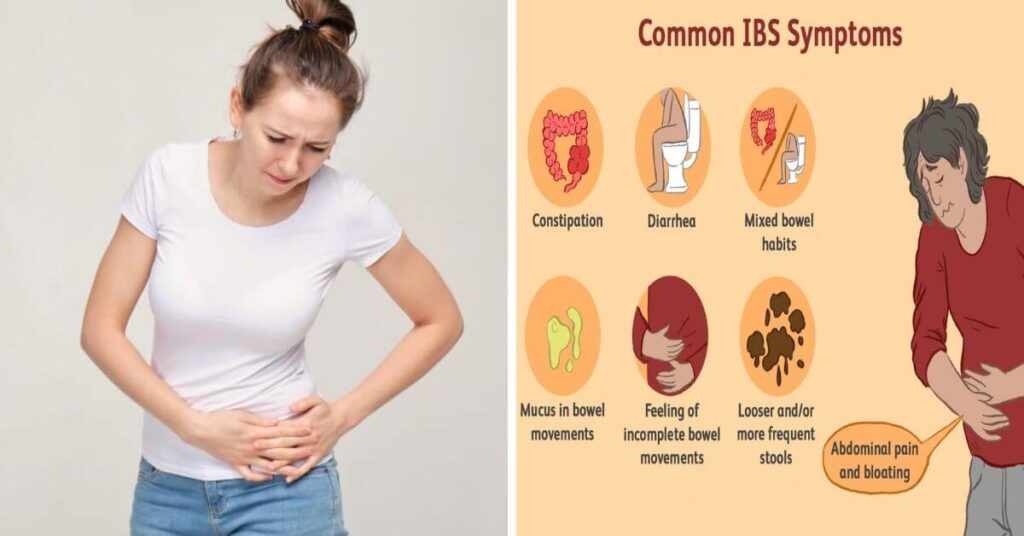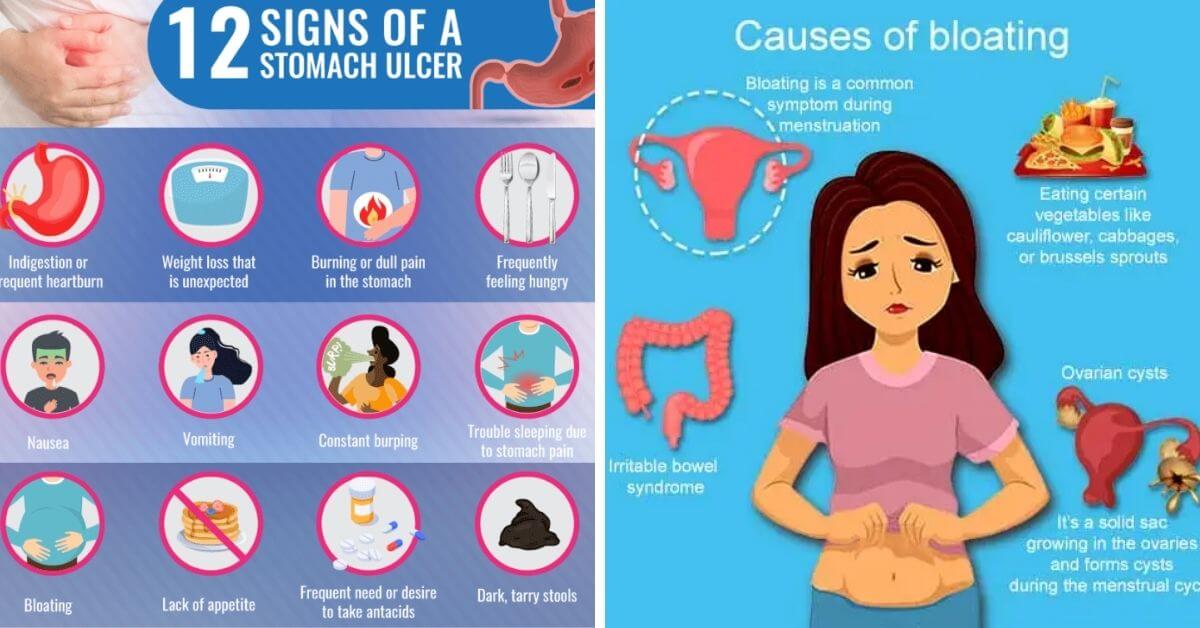Feeling like your stomach is constantly tight, swollen, or unusually hard? You’re not alone. Many people experience this frustrating and often painful symptom without fully understanding why it happens. Whether it’s occasional or persistent, bloating accompanied by abdominal hardness can signal everything from simple digestive issues to more complex medical concerns. Common triggers include gas buildup, constipation, hormonal fluctuations, food intolerances, stress, and gut imbalances. In some cases, it may point to more serious underlying conditions that need medical attention. This in-depth guide breaks down the top reasons your stomach may always feel bloated and hard and offers science-backed, practical solutions to help you feel better from the inside out.
Why Is My Stomach Always Bloated and Hard? The Real Reasons and Relieve
If you’ve been wondering, “Why is my stomach always bloated and hard?”, it’s a sign your body is trying to communicate something. While occasional bloating is common, a stomach that frequently feels swollen and firm can be a red flag for deeper imbalances.
Below are the most common biological and lifestyle-related causes behind a bloated and hard abdomen:
Trapped Gas in the Digestive Tract
One of the most common answers to the question, “Why is my stomach always bloated and hard?”, is trapped gas. While gas is a normal byproduct of digestion, excess buildup can lead to intense discomfort, visible bloating, and a tight, distended abdomen.
What Causes Gas to Get Trapped?
Gas forms in the intestines when bacteria ferment undigested carbohydrates. This happens naturally, but when digestion is slowed or certain foods are poorly tolerated, the gas can accumulate instead of being released through belching or passing it.
Here are a few everyday habits and biological factors that contribute:
- Eating too fast and swallowing air (aerophagia)
- Carbonated beverages like soda or sparkling water
- High-fiber foods that aren’t gradually introduced
- Artificial sweeteners like sorbitol and xylitol
- Gut bacterial imbalances (dysbiosis)
How It Feels:
When gas gets trapped, your abdomen can feel:
- Tightly stretched
- Painfully bloated
- Gurgly or crampy
- Pressured, especially after meals
The bloating may shift or improve after releasing gas or having a bowel movement. If it doesn’t, the buildup might be chronic.
How to Relieve Trapped Gas Naturally
- Eat slowly and chew food thoroughly
- Avoid drinking through straws or chewing gum
- Cut back on carbonated drinks and high-gas foods (like beans, cabbage, broccoli)
- Try gentle abdominal massage or movement (e.g., walking after meals)
- Introduce digestive enzymes or probiotics to help break down food
Did You Know? Most people produce up to 2 liters of gas per day. The problem arises only when the body can’t expel it properly.
Low Carb Gluten Free Foods: A Delicious Guide to Healthy, Guilt-Free Eating
Constipation and Stool Retention
If you’re regularly wondering, “Why is my stomach always bloated and hard?”, constipation may be one of the most overlooked yet common causes. When your digestive system slows down and bowel movements become infrequent, waste begins to back up leading to a visibly bloated, firm, and sometimes painful abdomen.
What Happens Biologically?
Constipation means your colon is absorbing too much water from waste material as it slowly moves through the intestines. This results in dry, hard stool that’s difficult to pass. At the same time, gas becomes trapped behind the stool, creating increased pressure in the gut.
Over time, this can make your belly feel:
- Hard and swollen
- Cramped or uncomfortable
- Gassy, but unable to pass it
- Heavy and sluggish
Clinical Definition: Less than 3 bowel movements per week, straining, or passing hard/lumpy stools regularly is classified as chronic constipation.
Signs You May Be Constipated
- Infrequent trips to the bathroom
- Feeling like you haven’t fully emptied
- Bloated belly that feels firmer by the day
- Discomfort or pressure after meals
Natural Ways to Relieve Constipation
- Increase fiber intake slowly through foods like oats, flaxseeds, chia seeds, and leafy greens
- Drink plenty of water (at least 2–3 liters per day)
- Add magnesium-rich foods (spinach, bananas) or a magnesium citrate supplement
- Build a consistent bathroom routine and don’t ignore the urge to go
- Use movement and light exercise (like walking or stretching) to stimulate bowel activity
Quick Tip: If you feel bloated but haven’t had a proper bowel movement in days, constipation is the likely cause. Addressing it can significantly reduce the hardness and tightness in your belly.
Food Intolerances and Sensitivities
If you’re asking yourself, “Why is my stomach always bloated and hard after eating certain meals?”, the answer could lie in food intolerances or sensitivities. Unlike allergies, which trigger immune responses, food intolerances affect digestion often silently until the symptoms become too obvious to ignore.
What Happens in the Gut?
When your body struggles to break down specific components in food like lactose, gluten, or fermentable carbs it leads to incomplete digestion. As these undigested particles reach the colon, gut bacteria begin to ferment them, releasing gas and inflammatory byproducts. This fermentation process causes the belly to become distended, tight, and bloated.
Common Food Triggers
- Lactose – Found in milk, cheese, yogurt (especially problematic if you’re lactase deficient)
- Gluten – A protein in wheat, barley, and rye; sensitivity can cause digestive upset even in non-celiac individuals
- FODMAPs – Short-chain carbs that ferment in the gut (onions, garlic, apples, beans, etc.)
- Artificial sweeteners – Sorbitol, mannitol, and xylitol often found in sugar-free gums and diet products
- Fructose – Found in fruit, juices, and sweeteners like high-fructose corn syrup
How It Feels
- Bloated within 30 minutes to 2 hours after eating
- Abdominal tightness and gas that doesn’t pass easily
- Irregular bowel habits (diarrhea, constipation, or both)
- Fatigue, brain fog, or skin breakouts after certain meals
Scientific Insight: Around 65% of adults worldwide have some degree of lactose intolerance. Many people go undiagnosed for years, mistaking symptoms for general bloating or indigestion.
What You Can Do
- Keep a food journal to track symptoms and identify patterns
- Try an elimination diet or low-FODMAP protocol under guidance
- Switch to lactose-free dairy or gluten-free grains
- Introduce digestive enzyme supplements (e.g., lactase, gluten protease) when needed
- Seek food sensitivity testing if symptoms persist
Pro Tip: Feeling bloated and hard after “healthy” foods like apples or lentils? Don’t be surprised FODMAPs are common in health foods, too.

Hormonal Fluctuations
If your bloating comes and goes with your menstrual cycle or certain phases of life, hormonal shifts could be the culprit behind your hard and swollen stomach. For many people especially women hormones play a significant role in how the gut functions and how the body retains fluid.
How Hormones Affect Your Stomach
Hormones like estrogen and progesterone don’t just regulate your reproductive system they also impact digestion and fluid balance. When these hormone levels rise and fall (such as during ovulation, PMS, pregnancy, or menopause), they can:
- Slow down gut motility (making food move more sluggishly)
- Cause fluid retention and bloating
- Alter gut-brain signals, leading to sensitivity and cramping
- Trigger digestive spasms, resulting in gas and abdominal tightness
This explains why some people experience a rock-hard belly or painful bloating before their period or during hormone replacement therapy.
Who Is Most Affected?
- Women during PMS or menstruation
- Pregnant women, especially in the first and third trimesters
- People with PCOS or endometriosis
- Perimenopausal and menopausal women
- Those taking birth control pills or hormone therapy
Signs Your Bloating Is Hormonal
- The tight, bloated feeling is worse in the second half of your cycle
- You notice a correlation between menstrual timing and bloating
- You also experience breast tenderness, mood changes, or cravings
- Bloating improves after your period begins
Fun Fact: Hormonal bloating isn’t just in your head studies show that progesterone can relax smooth muscle in the intestines, causing temporary digestive slowdowns.
Ways to Manage Hormonal Bloating
- Eat anti-inflammatory foods like berries, leafy greens, and turmeric
- Limit high-sodium and ultra-processed foods that promote water retention
- Support your hormones with B vitamins, magnesium, and omega-3s
- Try gentle movement (like yoga or walking) to improve circulation and digestion
- Stay well-hydrated, especially during PMS
Quick Tip: If your stomach always feels bloated and hard around the same time each month, track your symptoms it’s likely hormone-related and manageable with the right support.
Irritable Bowel Syndrome (IBS)
If you’re constantly asking, “Why is my stomach always bloated and hard?”, and you’ve ruled out diet or hormonal triggers, Irritable Bowel Syndrome (IBS) might be the hidden cause. IBS is one of the most common digestive disorders, yet it’s often misunderstood and underdiagnosed.
What Is IBS?
IBS is a functional gastrointestinal disorder meaning there’s no visible damage in the gut, but the way the gut works is disrupted. It affects how your intestines contract, how food moves, and how sensitive your digestive system is to normal stimuli.
This dysfunction leads to:
- Bloating and abdominal distension
- A feeling of tightness or hardness in the lower belly
- Cramping, gas, and irregular bowel habits
There are three main IBS types:
- IBS-C (constipation-dominant)
- IBS-D (diarrhea-dominant)
- IBS-M (mixed bowel habits)
Why Does IBS Cause a Hard, Bloated Belly?
In IBS, the gut becomes hypersensitive to stretching, gas, and certain foods. Even a small amount of gas can cause extreme bloating or tightness. Muscle contractions in the intestines may be too strong or too weak leading to stool retention or urgency, which intensifies bloating.
IBS is also strongly linked to the gut-brain axis, meaning stress, anxiety, and emotions can directly trigger physical gut symptoms.
Signs Your Bloating Might Be IBS-Related
- Your belly starts out flat but gets progressively more bloated throughout the day
- You feel better after a bowel movement or passing gas
- The bloating is accompanied by cramps, urgency, or inconsistent stools
- Stress or anxiety worsens your digestive symptoms
- You’ve ruled out celiac disease or IBD, but symptoms persist
Scientific Insight: IBS affects an estimated 10–15% of adults in the U.S., and it’s more common in women and people under age 50.
How to Manage IBS and Reduce Bloating
- Try a low-FODMAP diet (short-term) to identify trigger foods
- Eat smaller meals more frequently, and chew thoroughly
- Use peppermint oil capsules to relieve IBS-related bloating and cramping
- Manage stress through yoga, CBT, meditation, or breathing exercises
- Track symptoms in a food and mood journal to find patterns
Pro Tip: IBS bloating often feels like your stomach is “inflated like a balloon.” It may not be dangerous but it’s real, disruptive, and treatable with lifestyle changes.
The Best Natural Remedies for Bloating and Gas: A Complete Guide to Gut Relief
Gut Microbiome Imbalance (Dysbiosis)
Still wondering, “Why is my stomach always bloated and hard?” Even when you’re eating clean, sleeping well, and avoiding trigger foods, your belly might remain distended and tight often because of a hidden imbalance in your gut microbiome, known as dysbiosis.
What Is the Gut Microbiome?
Your intestines are home to trillions of microorganisms bacteria, fungi, and viruses that help you digest food, synthesize nutrients, regulate immunity, and even influence mood. Collectively, this ecosystem is called the gut microbiome.
When the balance between beneficial and harmful microbes shifts (due to poor diet, stress, antibiotics, or illness), you enter a state of dysbiosis. This disrupts digestion and leads to symptoms like:
- Persistent bloating and abdominal hardness
- Gas that feels trapped and painful
- Irregular or incomplete bowel movements
- Brain fog, fatigue, or sugar cravings
Science Fact: A healthy gut has around 85% good bacteria and 15% bad bacteria. Dysbiosis flips this ratio leading to poor digestion and inflammation.
What Causes Dysbiosis?
- Overuse of antibiotics (which wipe out both good and bad bacteria)
- Diets high in refined sugar, alcohol, and processed foods
- Chronic stress, poor sleep, or inflammation
- Frequent infections or food poisoning
- Long-term use of acid reducers (PPIs) or NSAIDs
Signs Your Bloating May Be from Dysbiosis
- Feeling gassy and tight even after small meals
- Bloating that doesn’t go away with dietary changes
- Constipation alternating with loose stools
- Strong food cravings (especially sugar or carbs)
- Skin issues (like acne or eczema) and low energy
How to Restore Gut Balance Naturally
- Eat fiber-rich, prebiotic foods (onions, garlic, leeks, bananas, oats)
- Add probiotic-rich foods like yogurt, kefir, sauerkraut, and kimchi
- Consider a high-quality probiotic supplement with multiple strains
- Limit sugar, processed carbs, and alcohol
- Manage stress to lower gut inflammation
Quick Insight: Restoring microbiome balance isn’t a quick fix it can take several weeks to months of consistent dietary and lifestyle support. But the relief from bloating, tightness, and digestive misery is worth it.
Overeating or Eating Too Quickly
Sometimes the answer to “Why is my stomach always bloated and hard?” is as simple as how you’re eating not just what you’re eating. Overeating or rushing through meals is a major cause of bloating, distension, and that rock-hard belly feeling that sets in right after eating.
Why It Happens Biologically
When you eat too fast or consume large portions, you swallow excess air (called aerophagia) and overload your digestive system. Your stomach and intestines struggle to break down food efficiently, causing fermentation, trapped gas, and abdominal pressure.
Fast or large meals also disrupt hunger and fullness hormones like ghrelin and leptin. This makes you more likely to eat past fullness, delaying digestion and increasing discomfort.
How to Know If You’re Eating Too Fast or Too Much
- You feel bloated or tight within 30–60 minutes after eating
- You often finish meals in under 10 minutes
- You don’t feel satisfied and go back for seconds too soon
- You experience heartburn, burping, or nausea post-meal
- You need to loosen your clothes after eating
Interesting Fact: It takes around 20 minutes for your brain to register fullness. If you eat faster than that, you’re more likely to overeat before your body even realizes it’s satisfied.
Simple Ways to Fix This and Beat the Bloat
- Chew each bite at least 20–30 times before swallowing
- Use smaller plates to reduce portion sizes
- Put down your fork between bites to slow the pace
- Avoid distractions like TV or scrolling while eating
- Start meals with a glass of water to aid satiety and digestion
Pro Tip: Your digestive system thrives on slow, mindful eating. Think of it as giving your gut a head start less gas, less pressure, and a more comfortable stomach after meals.

Stress and Anxiety
Ever notice that your stomach tightens up when you’re anxious or stressed? That’s not just in your head. If you’re constantly asking, “Why is my stomach always bloated and hard?”, your emotional state might be a major yet silent trigger.
How Stress Impacts Digestion
Your digestive system is directly connected to your brain through the gut-brain axis. When you’re stressed or anxious, your body enters “fight or flight” mode, releasing hormones like cortisol and adrenaline. These stress hormones:
- Slow down digestion
- Reduce stomach acid and enzymes
- Tense up abdominal muscles
- Alter gut motility (causing constipation, diarrhea, or both)
The result? Food sits longer in your stomach or intestines, fermentation increases, gas builds up, and your belly feels bloated, hard, and even painful.
Scientific Insight: Around 70–90% of serotonin your feel-good neurotransmitter is produced in the gut. So when you’re mentally stressed, your gut literally feels it.
Signs Your Bloating Is Linked to Stress or Anxiety
- Bloating worsens during work deadlines, social events, or emotional distress
- Your symptoms appear without dietary changes
- You feel abdominal tightness even when you’re not full
- You experience rapid heartbeat, shallow breathing, or insomnia along with digestive issues
- Your symptoms improve when you’re relaxed or on vacation
How to Ease Bloating Triggered by Stress
- Practice deep belly breathing (inhale for 4, hold for 4, exhale for 6)
- Try guided meditation or mindfulness apps daily
- Get regular physical activity even 20 minutes of walking can reduce cortisol
- Consider adaptogenic herbs like ashwagandha or rhodiola (with medical approval)
- Set boundaries, journal your feelings, or seek therapy if chronic stress is overwhelming
Pro Tip: Stress-related bloating can feel just as physical as food-related bloating. Don’t ignore the emotional side of your gut health it’s often the missing piece.
Serious Medical Conditions
Sometimes, the answer to why is my stomach always bloated and hard isn’t something minor like gas or overeating it can be a red flag for something more serious. While many cases of bloating are benign, persistent, painful, or severe bloating accompanied by other symptoms could signal an underlying medical condition that needs attention.
When Bloating Isn’t Just About Digestion
If you notice any of the following along with a constantly bloated and hard belly, it’s time to seek medical help:
- Sudden and unexplained weight loss
- Severe or persistent abdominal pain
- Blood in stool or rectal bleeding
- Prolonged constipation or diarrhea
- A noticeable mass or swelling in the abdomen
- Loss of appetite or feeling full quickly
These may be signs of one of the following:
1. Ovarian Cancer
Often called a “silent killer” because of its subtle symptoms, ovarian cancer may present as chronic bloating, pelvic pain, or a feeling of pressure in the abdomen. It’s most common in women over 50 but can occur at any age.
Key signs: Early satiety, hard stomach, bloating that worsens over time, changes in menstrual cycle
2. Ascites (Fluid Accumulation)
This condition involves the build-up of fluid in the abdominal cavity, often due to liver disease like cirrhosis, kidney failure, or certain cancers. The stomach may appear distended, round, and feel tight or hard.
Key signs: A visibly swollen belly, shortness of breath, discomfort in the abdomen, weight gain despite reduced appetite
3. Bowel Obstruction
A blocked intestine can trap gas, fluid, and stool, causing major distention and discomfort. This can result from adhesions, hernias, tumors, or even inflammatory bowel disease (IBD).
Key signs: Severe bloating, hard abdomen, vomiting, inability to pass gas or stool, cramping
4. Gastroparesis
In this condition, the stomach muscles don’t function properly, leading to delayed emptying. It’s common in people with diabetes or nerve damage and can cause bloating, nausea, and a firm belly.
Key signs: Feeling full quickly, bloating after small meals, heartburn, loss of appetite
5. Celiac Disease or Crohn’s Disease
Both are autoimmune digestive conditions that cause chronic inflammation in the GI tract. Bloating, abdominal pain, and a hard stomach are common symptoms, often triggered by food.
Key signs: Persistent bloating, fatigue, weight loss, diarrhea, nutrient deficiencies
Final Thoughts:
If you’re constantly wondering “Why is my stomach always bloated and hard?” know that your body is trying to communicate something important. Chronic bloating is a sign that your digestive system, hormones, diet, or stress levels are out of balance. But with targeted changes both lifestyle and medical you can absolutely reclaim your comfort and confidence.
From small tweaks like mindful eating and probiotics to investigating food intolerances and hormone shifts, the answers are out there. Listen to your gut literally and don’t be afraid to get help if the bloating feels abnormal or persistent.







